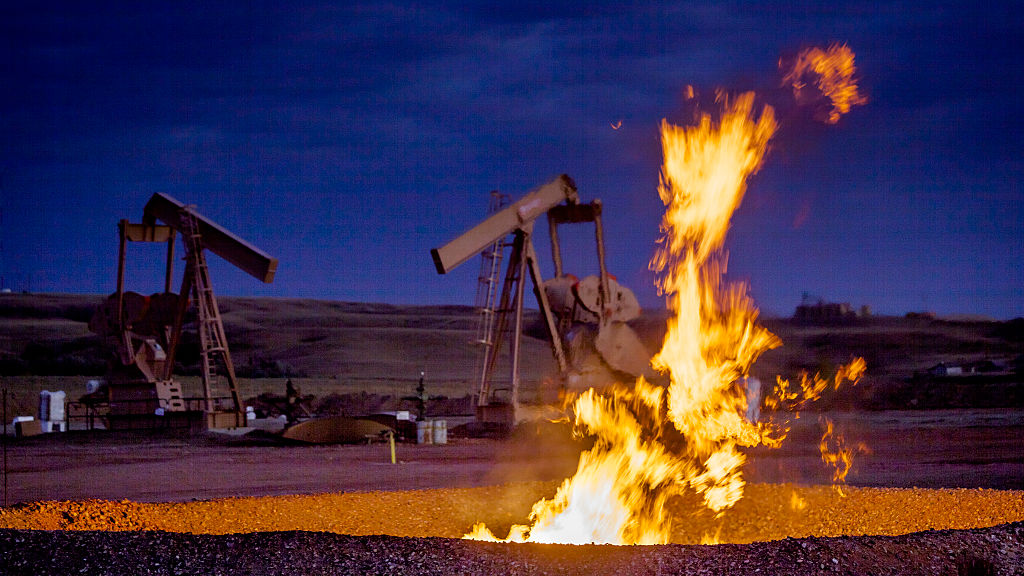
Methane belched from livestock operations, bubbling from rice paddies, and seeping from landfills, coal mines, and leaking pipelines is about 25 times as powerful as carbon dioxide at trapping heat in the Earth’s atmosphere. The world urgently needs to begin to draw down those emissions in order to limit the worst effects of climate change. But, so far, governments around the world have only made miniscule efforts to address the methane problem, even as emissions of the potent greenhouse gas continue to increase.
That is the conclusion of the first comprehensive assessment of methane policies from around the world, published in the journal One Earth today. According to the study’s findings, policies designed to cut methane emissions only cover about 13% the methane being released globally. And many of those policies don’t clamp down on emissions nearly as much as they need to, often because they are based on poor information about the real extent of the emissions problem.
“The conclusion is very surprising,” says Maria Olczak, a PhD candidate at Queen Mary University of London and a consultant at the Environmental Defense Fund, who served as first author on the paper. “Especially given the fact that we know exactly what we need to do in order to be closer to the trajectory that is compatible with net zero targets.”
Methane emissions are a powerful driver of climate change, but the gas doesn’t stay in the atmosphere as long as carbon dioxide—methane sticks around in the atmosphere for about 12 years, while carbon dioxide can persist for centuries. That raises the imperative to cut methane emissions quickly, since fast reductions could have a big short term effect on global temperatures, giving the world more time to implement more difficult long term carbon dioxide cuts. If humanity manages to cut methane emissions by 45% by 2030, the result would avert 0.3°C of global heating by 2045, according to a 2021 study cosponsored by the Climate and Clean Air Coalition and the U.N. Environment Programme.
Governments around the world, however, have significant blind spots in how they regulate methane emissions, according to the study published today, the culmination of more than two years of work analyzing hundreds of regulations from countries around the world.
Read more: Cow Burps Have a Big Climate Impact. Solving That is Harder than You’d Think
Livestock production accounts for about a third of global methane emissions (other agricultural sources, like methane releases from rice paddies, also contribute to agriculture’s total impact as the largest source of human-caused methane emissions.). Enteric fermentation—cow burps, basically—account for about 89% of those livestock emissions. Yet the study found that global methane policies mostly ignore that source and target emissions from manure instead, a far smaller slice of livestock emissions. In general, curbing agricultural emissions will be difficult, in part because it requires people around the world to change their consumption habits. “This stuff, much more than other sectors, really touches on culture,” says Paul Balcombe, an author on the study, and a senior lecturer in chemical engineering and renewable energy at Queen Mary University of London. “So it’s way more politically sensitive.”
Fossil fuel production is the second largest source of methane emissions, accounting for about a third of humanity’s total. Coal mining and oil drilling can release methane trapped under the surface of the earth. Leaking pipes transporting methane to processing facilities, homes, and power plants also contribute significantly to emissions. While there are some regulations on the oil and gas sector, the authors note, the coal mining industry has largely escaped methane restrictions. That methane, released when miners carve through coal seams underground, accounts for a similar share of near-term global warming as all of China’s 1,100 coal power plants, according to a report published by Global Energy Monitor last year. Abandoned oil and gas wells, and disused coal mines, which often leak methane long after they’ve been shut down, have also largely skirted regulation around the world.
Methane emissions from the fossil fuel industry, however, are considered to be the low hanging fruit of the global climate transition, since much of it could be phased out at very low cost. About 40% of U.S. methane emissions, for instance, could be eliminated at no net cost to the industry, according to the U.S. Energy Information Agency, since fossil fuel companies can sell the methane they don’t emit as natural gas.
Read more: The IRA is Spurring Fossil Fuel Companies to Monitor Methane Leaks from Space
There has been some recent progress on this front that isn’t captured by the new study. Last November at the COP27 climate conference in Egypt, for example, the Biden Administration proposed strict new rules targeting U.S. oil and gas sector methane emissions. And earlier this month the European Union voted through stricter methane rules for the oil and gas industry.
Still, the world has a long way to go. Methane emissions have a different global distribution from CO2 emissions, but the developed world is still responsible for the lionshare of the problem. Poorer countries will likely need access to financing and technological transfer from the developed world to curb their own methane emissions. In some cases, energy companies based in the U.S. or Europe are effectively able to outsource methane emissions by expanding extraction in developing countries, where methane regulations may be looser.
“Because we’re at such an early stage of reducing methane emissions, we really need to focus on what are the most cost effective sectors to reduce,” says Balcombe. “Quite frankly, that’s the energy sector.”
More Must-Reads from TIME
- Cybersecurity Experts Are Sounding the Alarm on DOGE
- Meet the 2025 Women of the Year
- The Harsh Truth About Disability Inclusion
- Why Do More Young Adults Have Cancer?
- Colman Domingo Leads With Radical Love
- How to Get Better at Doing Things Alone
- Michelle Zauner Stares Down the Darkness
Write to Alejandro de la Garza at alejandro.delagarza@time.com